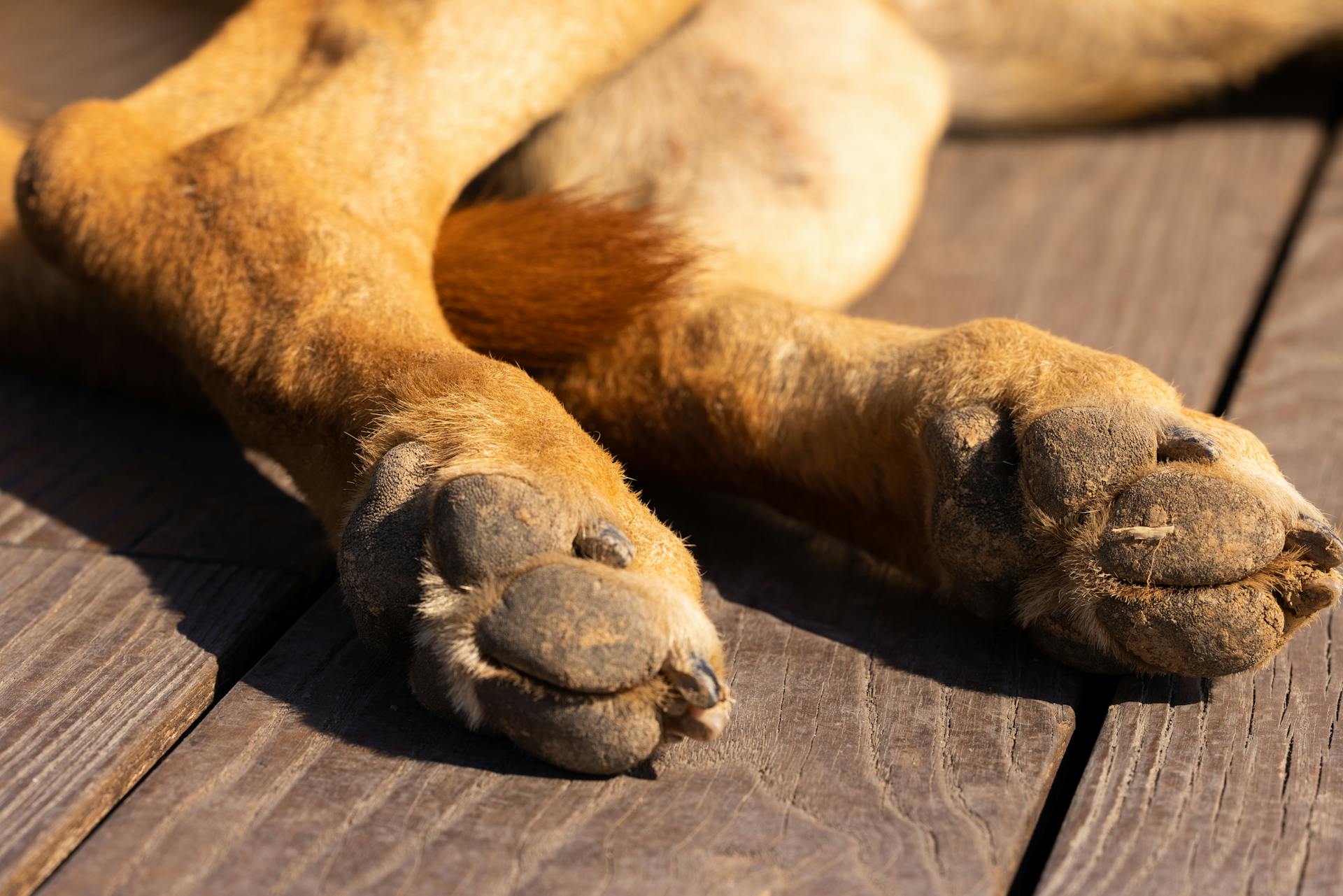
Dog paw odor can be a real problem for many dog owners. It's caused by the buildup of sweat and oils on your dog's paws, which can lead to a strong, unpleasant smell.
Regular cleaning and drying of your dog's paws can help reduce the odor. In fact, research suggests that dogs that are bathed and dried regularly have significantly less paw odor than those that are not.
To keep your dog's paws fresh, try to clean them at least once a day, paying special attention to the areas between the toes. This is where bacteria and oils tend to accumulate, causing the smell.
Causes of Dog Paw Odor
Dog paws can smell like Fritos due to the presence of two types of bacteria: proteus and pseudomonas. These bacteria thrive in the moist environment of a dog's paws, where they can multiply and cause a strong, corn chip-like odor.
Dogs' paws are exposed to dirt, dust, and moisture, which creates an ideal breeding ground for bacteria and fungi. As a result, most dogs have some level of these microorganisms present on their paws, leading to the Fritos smell.
In addition to bacteria, injuries and allergies can also contribute to the development of smelly feet in dogs. Cuts, puncture wounds, or allergies can make a dog's paws more susceptible to bacterial or yeast overgrowth.
Dogs sweat through their paw pads, creating a moist environment that promotes the growth of microorganisms. This is especially true in hot or humid weather, or when a dog is stressed.
Here are some common causes of smelly feet in dogs:
- Injuries and Allergies: Cuts, puncture wounds, or allergies can cause your dog’s feet to become more susceptible to bacterial or yeast overgrowth.
- Moist Environments: Dogs sweat through their paw pads, creating a moist environment ideal for microorganism growth.
- Licking and Chewing: Dogs often lick or chew their paws due to irritation or itchiness, further adding moisture and promoting bacterial growth.
Preventing and Reducing Odor
Keeping your dog's paws clean and dry is key to preventing and reducing odor. Regularly washing their paws with soap and water or using cleansing wipes can help, especially after outdoor activities.
It's also essential to check your dog's paws regularly for signs of injury or irritation, and to keep their nails trimmed to prevent bacteria buildup. Long nails can collect bacteria from the ground, so keeping them trimmed can help prevent this issue.
To reduce moisture between paw pads, gently dry your dog's feet with a soft towel after swimming or exposure to rain, hot, or humid weather. You can also keep the fur between their paw pads short to help cut down on debris and moisture.
Preventing Body Odor
Keeping your dog's paws clean and dry is essential to preventing body odor. Regularly washing your dog's paws with soap and water or using cleansing wipes can help reduce the odor on their feet.
Moisture can provide a breeding ground for bacteria and yeast, so it's also a good idea to keep your dog's paws dry. This can be done by drying them thoroughly after washing or using a towel to absorb excess moisture.
Keeping your dog's nails trimmed can help prevent the build-up of bacteria on their paws. Long nails can collect more bacteria from the ground, so regular nail trimming is a simple way to combat this issue.

Checking your dog's paws regularly for signs of injury or irritation can help prevent infections. If you notice any issues, it's best to contact your vet at the first sign of problems so treatment can begin before the issue becomes serious.
Regular wellness check-ups with your vet can also help detect early signs of paw issues before they bother your dog.
If this caught your attention, see: Vets Dog Treats
Reducing Moisture
Dogs sweat through their feet to release heat, and when moisture combines with heat without being allowed to dry out regularly, bacteria or yeast can invade.
Regularly drying your dog's feet with a soft towel can help reduce moisture between paw pads, especially after swimming or in rainy, hot, or humid weather.
Keeping the fur between their paw pads short can also help reduce debris and moisture, allowing the feet to dry out better and reducing odor.
Trimming your dog's nails can help prevent bacteria build-up, as long nails can collect more bacteria from the ground.
Regular wellness exams with your veterinarian can help catch and address potential issues early, including skin conditions that may be contributing to moisture and odor.
Here are some easy ways to reduce moisture in your dog's paw pads:
- Dry their feet with a soft towel after swimming or in rainy, hot, or humid weather.
- Keep the fur between their paw pads short.
- Trim their nails regularly.
Understanding and Countering Odor
Moisture breeds bacteria, so it's essential to keep your dog's paws as dry as possible. Regularly wiping their paws clean and drying them thoroughly can help prevent the growth of microorganisms.
Dogs sweat through their paw pads, creating a moist environment ideal for microorganism growth. This is especially common in dogs that regularly lick their feet or spend time in the water.
Trimming the hair between your dog's toes and around the paw pads can help reduce moisture and debris. You can trim it yourself or take your dog to a groomer.
Giving your dog regular baths, paying special attention to their feet, can also help reduce odor. Use a hypoallergenic, pet-specific product to reduce itchiness and keep their skin feeling great.
Check this out: How to Keep Dog's Paws Cool in Summer?
Here are some common causes of smelly feet in dogs:
- Injuries and allergies: Cuts, puncture wounds, or allergies can cause your dog's feet to become more susceptible to bacterial or yeast overgrowth.
- Moist environments: Dogs sweat through their paw pads, creating a moist environment ideal for microorganism growth.
- Licking and chewing: Dogs often lick or chew their paws due to irritation or itchiness, further adding moisture and promoting bacterial growth.
Regularly checking your dog's paws for signs of injury or irritation and keeping them clean and dry can help prevent the growth of bacteria and yeast.
Diagnosis and Treatment
A thorough examination of your dog's paws is the first step in diagnosing the cause of the odor. This can be done by a veterinarian, who will look for signs of infection or discomfort.
Medicated wipes, sprays, and shampoos are common treatments for smelly dog feet. These can be used to directly address the overgrowth of bacteria or yeast on the paws or other areas.
In some cases, food sensitivities may contribute to the skin issues causing the odor. Adjusting your dog's diet can help alleviate the problem.
Oral antibiotics or antifungals may be necessary in severe cases of infection. Your veterinarian will determine the best course of treatment for your dog.
Here are some common treatments for smelly dog feet:
- Medicated wipes
- Sprays
- Shampoos
- Prescription diet
In some cases, no treatment is needed, and the Frito-like smell is simply a result of natural bacteria and yeast. Regular grooming can help mask the smell if it's offensive to the owner.
Sources
- https://www.thesprucepets.com/dog-paws-smell-like-corn-chips-3385624
- https://www.marketplaceveterinary.com/blog/smelly-paws-the-truth-about-canine-frito-feet/
- https://bettervet.com/resources/pet-symptoms/dog-frito-paws
- https://bottletreeanimalhospital.com/blog/dogs-feet-smell-like-fritos/
- https://be.chewy.com/is-this-normal-why-do-my-dogs-feet-smell-like-fritos/
Featured Images: pexels.com


